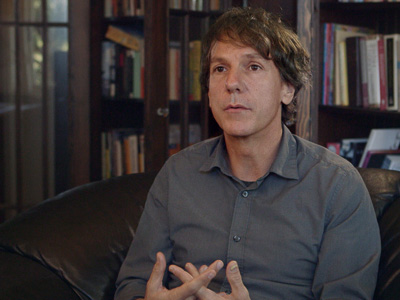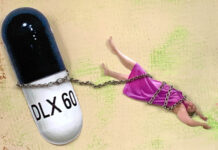Will Hall, a therapist and researcher and former psychosis patient, among other roles, recently published a paper that explores patient-centered experiences of drug withdrawal and calls attention to the recent momentum of patient/survivor movements. He connects reductionist ideas about psychiatric medication to reductionist ideas about madness, urging a rethinking of what constitutes “health.”
“Reconsidering medication efficacy parallels rethinking madness itself,” writes Hall. “Are mental illness and psychosis brain disorders as claimed? And what of patients who took medications under assumptions that are now questioned? As a result of this growing skepticism, calls are emerging for more research, especially to fill the gap of investigation into medication withdrawal.”

Hall begins by highlighting recent trends toward collaboration between patients and providers across a variety of medical settings. When it comes to medical decision making and research, collaboration has been found to increase patient outcomes and satisfaction. In the realm of psychiatry, however, cooperation has been lagging.
Recent research increasingly recommends caution around the potential adverse effects and harm caused by taking psychiatric medications. Many endure severe withdrawal effects as they endeavor to discontinue use in the face of resistance and lack of support. The importance of psychiatric treatment decisions is precisely what warrants greater collaboration, Hall argues.
“To be fully human means being recognized as having equal rights to choose medical risk,” Hall writes.
Further, Hall contends that psychiatry can learn from observing how patients have approached withdrawal from medications related to other conditions, such as epilepsy, chronic pain, and type 2 diabetes, to name a few. He outlines the common experiences across patients in drug withdrawal which are mirrored in survivor movement approaches in psychiatry:
- Diversity and unpredictability. Conditions manifest differently across different people, and similarly, medications elicit different effects. Opinions vary across physicians, and all decisions carry risk.
- Tailoring decisions to individual needs. “One size does not fit all,” when it comes to treatment decisions. Often, various lifestyle changes are often behind decisions to withdraw from medication.
- The importance of gradual withdrawal. Except for circumstances where abrupt withdrawal is necessary, gradual tapering can help to reduce rapid discontinuation effects.
- The paradox of making conditions worse. Some drugs, such as antiepileptic drugs, have the potential to exacerbate symptoms they were prescribed to treat. This concern has been voiced about antipsychotics.
- Informed risk-benefit consideration. “Much patient decision making focuses not on certainty but on risks and benefits to be calculated into a personal choice.”
- The dignity of risk and autonomy of the patient. “Patients are free to assume risk even where there is disagreement.”
- Risk of integrative and holistic medicine. Physicians are willing to integrate integrative treatments, even if they are skeptical of their mechanism of healing because it may strengthen the clinical relationship, motivate change, and improve patient agency.
“Psychosis Treatments or Psychoactive Substances?”
Hall notes that without evidence of biological markers, psychiatric drugs are best understood as psychoactive substances: they alter consciousness through either brain changes, placebo, or nocebo effects and they can create dependency similar to recreational substances. Despite years of research, Hall finds that there remains no consensus for best practice addiction treatment protocol, and once again, emphasizes the diversity that is likely to exist in the discontinuation process.
Two factors may inform withdrawal, he writes. 1) that the duration and degree of substance use may generally increase withdrawal difficulty, and 2) gradual withdrawal is usually recommended for most drugs.
However, despite the applications of addiction and withdrawal from recreational drugs to psychiatric drugs, Hall makes the case that social narratives have influenced popular understanding of addiction and the power of drugs. Studies conducted on rodents find that when their surrounding environment offers them social connection, physical freedom, and abundance, those previously addicted to morphine will elect to endure withdrawal effects. If the alternative is an environment featuring confinement, isolation, and food scarcity, this is no longer the case.
The implications of this research demonstrate the need to move away from disease models and toward understanding drug dependence as it functions within social and life contexts. Hall writes:
“As the psychiatric survivor movement challenges the reductionist biological view of human distress, it also needs a new model of psychiatric medications and withdrawal. Psychoactive drug discontinuation is a life change process and not reducible to a neurochemical event.”
Additionally, he cites researchers who caution against black and white understandings of drug responsivity and withdrawal:
“Doctors may believe that all patients respond to drugs and none to placebo, but neither statement is true because there is no ideal drug and many disorders remit spontaneously due to their natural course. Our preference for black or white over shades of grey is convenient, but it can offer only a ‘false clarity.’”
“What Helps? Common Factors”
When seeking treatment for psychiatric drug withdrawal, it is essential to recognize that psychotherapy is efficacious not because of specific interventions or approaches, but because of common factors. This means that the quality of the client-provider relationship, the confidence of the provider, and the capacity for patient feedback are more deterministic of positive therapy outcomes than the approach or model used. Thereby, it does not make sense to privilege one modality (e.g., 12 steps, Cognitive Behavioral Therapy, etc.) over another.
“A New Understanding of Health”
Hall closes by pushing for new understandings of health that recognize how symptoms are understood and identified culturally, how different people interpret and appraise their experiences, and that therefore, different people will choose to respond in different ways.
“Psychiatric drug discontinuation is further complicated by the culturally bound nature of symptoms,” Hall writes. “Signs of disease in one culture aren’t signs of disease in another, and individuals and their social context have different responses to troubling and unusual experiences and different degrees of tolerance of discomfort.”
Social context needs to be placed at the forefront, he concludes, and further, the voices of psychiatric patients must be at the center of these new initiatives.
“All oppressed groups confront legacies of scientific and medical research that endorses and legitimizes their oppression through claims of biological abnormality and inferiority,” Hall concludes. “Patients who have survived hospitalization and medicalization mistreatment are following a path parallel with other social movements, challenging institutionalized medical knowledge and advancing community self-knowledge.”
****
Hall, W. (2018). Psychiatric Medication Withdrawal: Survivor Perspectives and Clinical Practice. Journal of Humanistic Psychology, 0022167818765331. (Link)















If Will Hall has recovered from “Schizophrenia” as a result of not taking his medication, and remained well, then he can’t have had “Schizophrenia” (as we know it) – can he?
If a person recovers from Diabetes as a result of stopping Diabetes treatment – then they can’t originally have had Diabetes – can they?
The Point.
The point is that “Schizophrenia” itself is a complete “misnomer” .
Report comment
Yes, I agree Fiachra. It reminds me of a conversation with an NHS psychiatrist :
“Its not a psychological condition, its a serious psychotic illness that is organic in nature, a biochemical imbalance that is treatable with drugs, a thought disorder that needs a good whack to shift it. ” Once my eyebrows had resumed their normal position, I asked, well, how long do you have to stay on the drugs. “Oh about 1-2 years” was the answer. So its just a quick clonk with the drugs and you are recovered! Gosh!
How can this chemical imbalance disappear, permanently or at least semi-permanently it seems, when you temporarily gum up your brain with antihistamine? The point is that its all BS, to hoodwink you into being sedated and discharged with a medication dependency. I’m quite new to all this, and I’m just aghast that this happens in our health service, with no safeguards, recourse. checks and balances.
Report comment
The confidence with which they convey this totally unsupported disinfirmation that conflicts even with itself is quite astounding to me, even now. No provisios, no “we’re still exploring this area,” no “some people have different experiences…” Such arrogance in the face of no scientific support, it’s just baffling!
Report comment
As far as I know, Will Hall recovered by coming off psychiatric drugs (carefully) with Mainstream Psychotherapy, Meditation, Yoga and with Self Care.
It didn’t involve anything too mysterious.
When a Psychiatrist talks about “Schizophrenia” as being equivalent to a young persons Cancer of the Brain the reality is that it is nothing like this – until the Medical Treatment Begins.
Report comment
Good point; the subconscious mantra of psychiatry is “fake it till you make it.” Psychiatrists are trying to be “sciency” until real science supports their BS; they can ignore numerous scientific fallacies because they have “faith” in their religion.
Report comment
Would it be that the confidence they portray in making their pronouncements is inversely proportional to the confidence they feel about the evidence base for those pronouncements. Certainly the quick resort to articulating the party line and name calling and isolating serious critics of their thoughts and practices would suggest they don’t feel positioned to either counteract or ignore such critics?
It is baffling considering other professionals honesty and openness about the limits of what they can do, but that’s when they have something useful to offer!
Report comment
I totally agree.
Many many years ago a bipolar label was thrust upon me. I wrote to my GP explained that I had been raped as a child, that I was worried about money, I’d just sold my house moved to another city and waa completely dependent upon my husband’s income. The dot com crash was fully underway, I’m a web developer he ignored all this for a biochemical imbalance. I spent 2 weeks on dangerous drugs that he called medicine and 2 weeks coming off them.
I am disgusted that vulnerable people get abused by those that should be caring for them. My hard earned taxes pay for this atrocity.
Report comment
In Western culture few true (non-iatrogenic) cases of madness exist. No more psych drugs would reduce “mental illness” rates by 90% or so.
Report comment
Exactly ConcernedCarer,
“Schizophrenia” (as we know it) is iatrogenic.
Report comment
It absolutely is, Fiachra. The “schizophrenia treatments,” the antipsychotics (aka neuroleptics), can create the negative symptoms of “schizophrenia” via neuroleptic induced deficit syndrome, and they can create the positive symptoms of “schizophrenia” via antipsychotic and/or antidepressant induced anticholinergic toxidrome.
https://en.wikipedia.org/wiki/Neuroleptic-induced_deficit_syndrome
https://en.wikipedia.org/wiki/Toxidrome
And that information is according to “institutionalized medical knowledge,” given with the intent of “advancing community self-knowledge,” since the doctors are blatantly lying to their patients.
Report comment
Somebody Else,
Neuroleptics are never a success story!
Report comment
…this is why “schizophrenia” is described as a long term mental illness – because nobody “in treatment” gets better.
(I’ve presented my own “thesis” on this, with hard evidence frequently on this website).
Report comment
..but it is possible to get Completely Well “outside treatment”.
Will Hall has successfully demonstrated this, and explained how.
Report comment
This is so contradictory. Anyone care to elaborate? If not I’ll be back.
Report comment
OK I’m back. I guess what I was thinking isn’t all that complicated: simply that, while citing the “survivors movement” (does he mean the anti-psychiatry survivors movement?) and numerous challenges to the basic legitimacy of psychiatry itself, Will Hall nonetheless stays within the context of people talking these things over and/or working them out with their psychiatrists rather than recognizing the need to eliminate the psychiatric framework entirely. Hall, as a formerly (perhaps currently) psychiatrized person, is indisputably “one of us” but, despite his varied insights, seems to be focused on “educating” those whose primary frame of reference is the “mental health” system. As such his approach is primarily reformist rather than anti-psychiatry/abolitionist.
As to the specific subject matter, it’s hard to get behind anyone still referring to psychiatric neurotoxins as “medications,” or assuming that the best “experts” to supervise the detox process should be essentially the same people responsible for creating the dependency in the first place. This whole attitude of “everyone working together” to improve psychiatry and promote “mental health” will, hopefully, soon be seen as outmoded and naïve. Not that I hold Will responsible for all this, I’m sure he works hard.
Report comment
I’ve never met Will Hall but my feeling when watching and listening to him in videos is that he wants to be very careful not to upset the “mental health system”. It’s the same kind of feeling that I sometimes get from MIA. They want to dialog with the people running the system rather than just coming out and stating that it’s all a big bunch of bull shit. They want to find common ground as if there is any common ground. It’s like they feel that we’ll be looked at as crazies and we’ll be ignored if we get too adamant about all this. It’s like they tiptoe around the reality and think that the system is going to do the right and moral thing if we just talk rationally enough to them, over and over again.
Report comment
And I keep pointing out that dialog never convinced slave owners to set their slaves free. They had to be forced to do this against their wills.
Report comment
It’s the same kind of feeling that I sometimes get from MIA. They want to dialog with the people running the system rather than just coming out and stating that it’s all a big bunch of bull shit. They want to find common ground as if there is any common ground. It’s like they feel that we’ll be looked at as crazies and we’ll be ignored if we get too adamant about all this.
Sometimes you get that feeling? MIA’s official line is to “rethink” and improve psychiatry; for them to call it bullshit would be to risk their “credibility,” or being called Scientologists. But “credibility” is in the eye of the beholder, and based on whose approval is considered more valuable: in this case, apparently, that of “mental health” liberals more so than of victims of psychiatry.
Many of us have been aware of this for some time, and there have been more & more AP people looking at ways to get some anti-psych organizing going outside the ideological confines of MIA. Still MIA is a good forum for those who are working their way towards an anti-psychiatry understanding, as well as others.
Report comment
Lately I was thinking that this was just me but I’m glad to know that someone else has noticed. Yes, MIA is a good beginning but we need something more at this point. It’s a good place to get the real facts about what’s being done to people in the name of “good treatment”. But if you want to do something, really do something to break the back of the system, we’re not going to find it here.
Report comment
Stephen, I’ve been trying to find a contact add. for you to no avail; could you give me a shout at [email protected]? (Hopefully before anyone notices this, but whatever.) Just want to ask you something.
Report comment
Well many of us are viewed as “crazies” already.
Report comment
Will remains uncertified despite earning graduate degrees. I think his advice on coming off psych drugs and personal non-compliance play a role in this decision.
Report comment
Will Hall is defintely a “fully paid up” ex member of the “psychiatric system”.
Will Hall is also proven to be an extremely ABLE + PRODUCTIVE member of Society (after Recovering as a result of:- “not taking his medication”).
Oldhead: “medication” is with sarcasm – a lot of people don’t appreciate that it is with sarcasm – but I would maintain that it is.
Report comment
I need medication.
Report comment
You don’t have to justify yourself to anyone here. If you feel that you need it then you don’t have to make excuses to anyone here and you don’t have to defend your decision. If you feel that you need it then you need it, plain and simple. All of this should be a matter of freedom of choice to do as each person sees fit with their own lives. No one here has the right to tell you what you should be doing. If anyone here tries to shame you for doing so then they’re just as bad as the system that doesn’t give anyone any choice at all about what happens to them while in its clutches.
As I stated somewhere else, I suspect that you’re a person with lots of strengths. You work and you go to the gym, despite dealing with the voices. I admire the determination and strength that doing such takes. It can’t be easy but you do it anyway. But you owe no explanations to anyone here about your choices concerning your own health and well-being.
Report comment
Have you not seen people get knocked out of this forum repeatedly over the years? I’m not gonna explain because everyone has seen it over and over.
Don’t underestimate the man or women next to you that you think you know what’s best for.
Appreciate your comment however.
Report comment
Yes, people here can be rough on those who say they need psych pills. No one has ever been banned from this site for saying this though.
And I’ll bet if one of those of us who are angry at psychiatry posted on Healthy Place, NAMI or some other popular site for the SMI:
“My drugs damaged my kidneys and heart along with diabetes that won’t respond to insulin. I’ll be dead soon thanks to treatment.”
“Thanks to psychiatry I went psychotic and had horrible mood swings causing me to squander my life savings and act bizarrely to those around me. Now my family has disowned me.”
“Thanks to psychiatric pills and labels–along with being forced to attend years of group therapy and day treatment–at 50 I have never been gainfully employed.”
“My psych drugs made me impotent. But that’s actually good. Because they also made me morbidly obese, caused disfiguring tics, along with poor communication skills from feeling numb. And no one wants to date a ‘bipolar-schizo.’ Might as well be given the Bob Barker treatment.”
“Thanks to psychiatric treatments I’m hideously disfigured by tardive dyskinesia and pace uncontrollably for half the day. I’m a miserable recluse and my emotional problems are worse than before.”
These people would be censored and booted off in no time flat! Can’t have pill shaming after all. Screw their lived experiences. 😛
Report comment
After devoting much of the last 4 years researching “How could this happen to me?” & sacrificing 11 years to the industry with a ‘lifelong’ bipolar & SMI certification, it’s clear that Scientology & the Industry have more in common than either will ever acknowledge. They’re both defined as cults with ‘bibles’, an autonomous ruling party, & the goal of control and lifelong revenue conduits by their ‘members’. Being drugged/ ‘going clear’ is simply force-feeding the Kool-Aid; many stay in from fear, stripped of self-determination and resources. Being drugged & brainwashed are identical, resulting in a hard bend of the knee that is impossible, in so many cases, to straighten up from.
As I fought my way out with zero credibility vis a vis` the diagnoses and achieved the ‘trifecta’ with a CMO/VP guidance off neuros, vacation of bipolar, & decertification of SMI designation (while drugged, of course) because of liability (there was SOME ethical application; the process took 2.5 years) from multiple NMS AND anaphylaxis crisis, I was barreling along with no blue-print, fueled by outrage & terror; I was “Ride or Die” for my poor ravaged brain.
Where are the others like me? I’ve only found one media story; he was a Navy pilot, falsley diagnosed in 2004, lost everything (like me), and has achieved a reversal, with ‘official walking papers’ (like me) 10 years later in Mo.
Anybody else out there in the ‘Unicorn’ club?
Here’s the thing; THEY reversed the “lifelong” bs, acknowledging my life facts before & during didn’t meet THEIR OWN criteria; I was being passed around the industry like a lab animal. NOW, they are forced to acknowledge my credibility; they’re metrics tell the story, they’re clinical notes didn’t correspond to THEIR criteria, the violent rejection of the drugs by my healthy brain was consistent for over a decade. My diagnosing doctor (2004) takes $65 grand annually from pharma (ProPublica; “Dialing for Docs”). It’s all there…and more.
In 2015, when I insisted on seeing my SMI paperwork (a marriage counselor’s assessment, 2007), the supervisor blurted out “We don’t do things like this anymore”. As they say….it was a moment.
MIA seems to have good intentions…but f*#k that….harder language & more confrontational positions are necessary. 60 Minutes expose`on the opioid crisis told HALF of our story. Our toe is in the door. Forget waves of public ‘support’, the info landscape is overloaded.
It’s up to US to be bold and make our case quicker, harder, smarter, & aggressively. It seems that the movement is being entirely too PC, too careful, too conservative. There’s been so little progress; there’s nothing to lose & EVERYTHING to gain.
But for the pesky (small, I’m told) seizures, I’m rebuilding & can’t stop talking about this ethical dumpsterfire.
Report comment
“It seems the movement is being too PC, too careful, too conservative.” I agree Stella.
Are you referring to the movement here or a larger one outside MIA?
I don’t defend, let alone advocate for Scientology. But they have far less credibility and power than Psychiatry. I don’t see courts calling in the inner circle of Scientologists for help making making decisions. Nor do Scientologists have any LEGAL right to lock someone up, inject them with toxic amounts of LSD and other drugs, damage their brains with electric volts, etc.
So Psychiatry is a much bigger threat than the kooky cult they go around accusing every doubter of joining.
Report comment